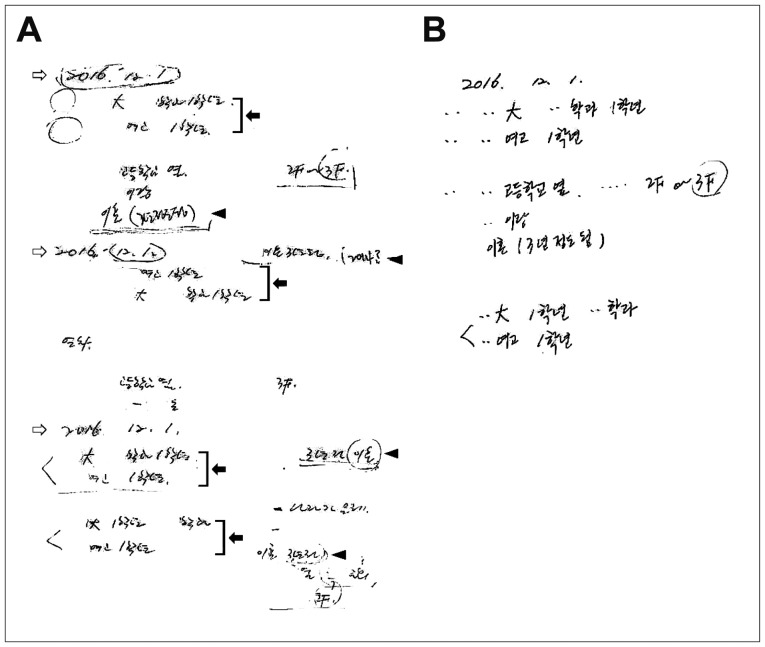Dear Editor,
Transient global amnesia (TGA) is a syndrome involving temporary memory loss. TGA mainly occurs in middle-aged to elderly individuals and can last up to 24 hours.1 During a TGA episode, patients typically ask repetitive questions, and this characteristic behavior has been considered as an important diagnostic feature for TGA.2 We report on a patient with TGA who presented with repetitive questioning as well as repetitive writing during the TGA episode.
A 52-year-old woman visited our emergency room with her husband, who described her condition as asking repetitive questions despite repeatedly being given correct answers. He had observed that she appeared agitated and cried during the early phase of the episode. Even after her husband had adequately answered her questions, the patient repeatedly asked questions like “Why am I here?” and “What is the date today?” Her husband also presented papers with writings that the patient had made during the period of the TGA episode. In these writings, the patient repetitively asked and wrote about the date of symptom onset, her worries regarding the marital state of her younger sister, and the name of the school and the grades her children were in (Fig. 1A).
She had completely recovered to her baseline status after about 6 hours of memory loss and altered behavior. On the day after the TGA episode, we asked the patient to rewrite the same content to allow us to compare the text with that produced during the episode (Fig. 1B). The patient's style of writing during the TGA episode was more cursive than at baseline, but no grammatical or spelling errors were observed (Fig. 1A). During the episode, the patient showed no signs of neurological deficits, and the findings of physical and neurological examinations were normal. She had no medical history of vascular risk factors or drug use. The results of the laboratory tests were within normal limits. Brain computed tomography showed no abnormalities, and diffusion-weighted imaging revealed no specific dot lesions. Electroencephalography performed three times did not reveal any epileptiform discharges. No further episodes developed during the 2-month follow-up period.
A diagnosis of TGA depends on the patient's history. Characteristic repetitive questioning is a common symptom that accompanies an episode and needs to be witnessed by an observer to fulfill the criteria for TGA.123 Cognitive impairment is typically restricted to memory loss with no aphasia or apraxia. While there has been one case report of grammatical and spelling errors during text messaging on a cellular phone, and without repetitive writing,4 our patient showed repetitiveness in handwritten text on paper without any grammatical or spelling errors. Abnormal venous drainage from the temporal lobes has been considered a feasible hypothesis for the pathogenesis of TGA, although the precise cause and mechanisms of TGA remain unclear.5 The authors suggested that repetitive questioning and writing is related to an altered state of the temporal lobe, which is involved in memory impairment and automatic behaviors. In the absence of witnessed amnesia or repetitive questioning, repetitive writing could act as crucial evidence for the diagnosis of TGA. Although TGA has been considered to be a self-limited and benign disorder, it should be differentiated from acute amnestic syndromes including transient ischemia, transient epileptic amnesia, and complex partial seizure.
To the best of our knowledge, this is the first case report of repetitive questioning and writing in a patient with TGA. Our case has shown that a detailed history of the presence of repetitive questioning or writing could improve the diagnostic accuracy of TGA and reduce the probability of taking aspirin or antiepileptic drugs unnecessarily.
References
1. Hodges JR, Warlow CP. Syndromes of transient amnesia: towards a classification. A study of 153 cases. J Neurol Neurosurg Psychiatry. 1990; 53:834–843. PMID: 2266362.

2. Shekhar R. Transient global amnesia--a review. Int J Clin Pract. 2008; 62:939–942. PMID: 18248396.
3. Bartsch T, Deuschl G. Transient global amnesia: functional anatomy and clinical implications. Lancet Neurol. 2010; 9:205–214. PMID: 20129169.

4. Kwon OD. Transient global amnesia developed in a 14-year old girl during cellular phone texting. Dement Neurocognitive Disord. 2014; 13:153–156.

5. Arena JE, Rabinstein AA. Transient global amnesia. Mayo Clin Proc. 2015; 90:264–272. PMID: 25659242.

Fig. 1
During the TGA episode, the patient repetitively wrote about the date of symptom onset (open arrows), her worries regarding the marital state of her younger sister (arrowheads), and the name of the school and the grades her children were in (closed arrows) (A). After completely recovering from TGA, we asked the patient to rewrite the same content (B), and compared the two texts. TGA: transient global amnesia.





 PDF
PDF ePub
ePub Citation
Citation Print
Print


 XML Download
XML Download